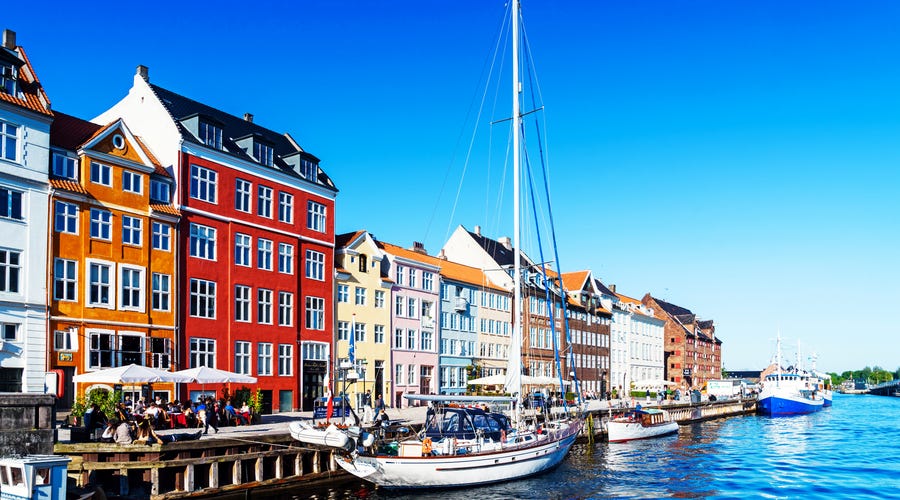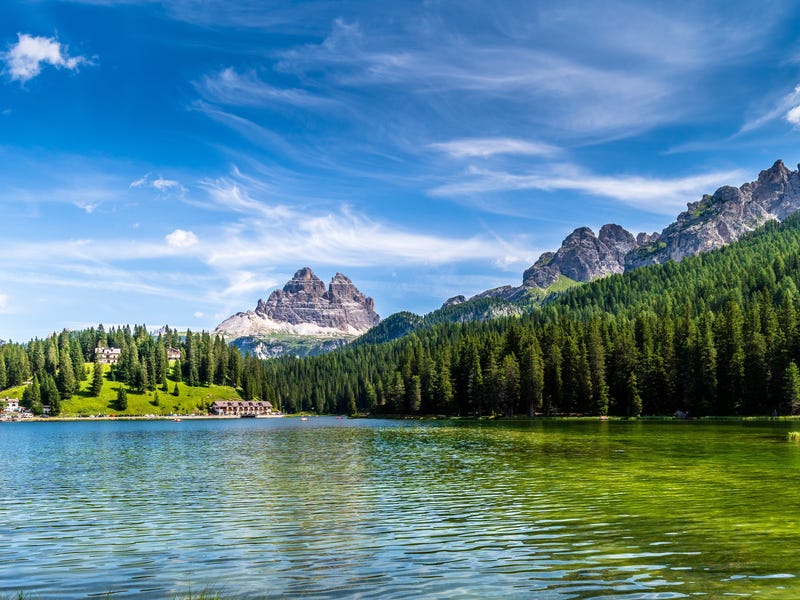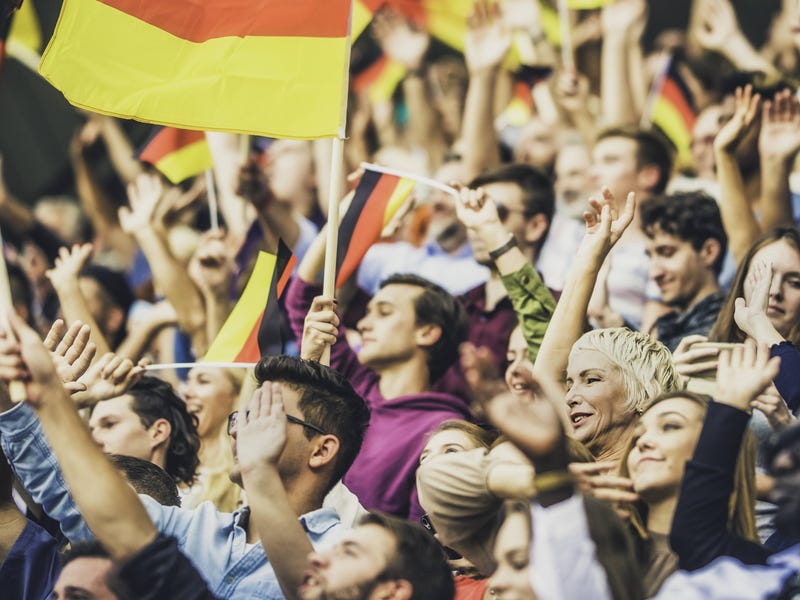
How to say nationalities & countries in German with confidence
Author: Marie Schmoll
There are hundreds of countries and thousands of cities in the world, and every single one of us has a different idea of home. Being able to learn about each other’s backgrounds is one of the greatest benefits of language learning.
One of the first questions to ask when you meet a German-speaker is “Where are you from?” and if you found our helpful guide on how to ask people about their origins in German, you already know this one.
The question itself is easy enough but the answer can be a lot more complex.
Not all German-speakers are actually from a German-speaking country. That’s why we collected a long list of countries and cities in German that will help you understand people’s origins better. Soon you’ll be able to make friends from all over the world and learn all about their countries and hometowns!

List of continents in German
To give people a rough idea where you’re from, you can always start with the continent or larger area, before you go into more detail about your country or city.
| English | German | IPA |
| Continent | Kontinent | [ˈkɔntinɛnt] |
| Africa | Afrika | [ˈaːfʁika] |
| North America | Nordamerika | [ˈnɔʁtʔaˌmeːʁika] |
| Central America | Mittelamerika | [ˈmɪtl̩ʔaˌmeːʁika] |
| South America | Südamerika | [zyːtʔaˈmeːʁika] |
| Asia | Asien | [ˈaːzi̯ən] |
| Europe | Europa | [ɔɪ̯ˈʁoːpa] |
| Oceania | Ozeanien | [ot͡seˈaːni̯ən] |
| Australia | Australien | [aʊ̯sˈtʁaːli̯ən] |
List of countries in German
“Countries” in German is “Länder” and the singular is “das Land”. This is related to the English “land” and the original meaning focuses more on the geography of the land itself than on its political borders. We’ve listed the majority of countries for you, divided by continent. Luckily, they’re all very similar to the English names, so memorizing them shouldn’t be too hard!
African countries in German
The population census shows that 1% of Germany’s population consists of minorities with passports from African countries, mostly from Morocco, Eritrea and Nigeria. Many more officially have German citizenship but a background that involves at least one of these African countries:
| English | German | IPA | Flag |
| Algeria | Algerien | [alˈɡeːʁiən] | 🇩🇿 |
| Angola | Angola | [aŋˈɡoːlaː] | 🇦🇴 |
| Cameroon | Kamerun | [ˈkaməʁuːn] | 🇨🇲 |
| Cape Verde | Kap Verde | [kap ˈvɛʁdə] | 🇨🇻 |
| Republic of the Congo | Die Republik Kongo | [ʁepuˌbliːk ˈkɔŋɡo] | 🇨🇬 |
| The Democratic Republic of the Congo | Die Demokratische Republik Kongo | [ˌdemoˈkʁaːtɪʃə ʁepuˌbliːk ˈkɔŋɡo] | 🇨🇩 |
| Egypt | Ägypten | [ˌɛˈɡʏptn̩] | 🇪🇬 |
| Equatorial Guinea | Äquatorialguinea | [ˌɛkvatoˈʁi̯aːlɡiˌneːa] | 🇬🇳 |
| Ethiopia | Äthiopien | [ɛˈti̯oːpi̯ən] | 🇪🇹 |
| Ghana | Ghana | [ˈɡaːna] | 🇬🇭 |
| Ivory Coast | Die Elfenbeinküste | [ˈɛlfn̩baɪ̯nˌkʏstə] | 🇨🇮 |
| Kenya | Kenia | [ˈkeːni̯a] | 🇰🇪 |
| Libya | Libyen | [ˈliːbi̯ən] | 🇱🇾 |
| Mauritius | Mauritius | [maʊ̯ˈʁiːt͡si̯ʊs] | 🇲🇺 |
| Morocco | Marokko | [ˌmaˈʁɔko] | 🇲🇦 |
| Mozambique | Mosambik | [ˌmozamˈbiːk] | 🇲🇿 |
| Nigeria | Nigeria | [niˈɡeːʁia] | 🇳🇬 |
| Rwanda | Ruanda | [ʁuˈanda] | 🇷🇼 |
| Senegal | Senegal | [ˈzeːneɡal] | 🇸🇳 |
| Somalia | Somalia | [zoˈmaːli̯a] | 🇸🇴 |
| South Africa | Südafrika | [ˌzyːtˈʔaːfʁika] | 🇿🇦 |
| Sudan | Sudan | [zuˈdaːn] | 🇸🇩 |
| Syria | Syrien | [ˈzyːʁiən] | 🇸🇾 |
| Tunisia | Tunesien | [tuˈneːzi̯ən] | 🇹🇳 |
| Uganda | Uganda | [uˈɡanda] | 🇺🇬 |
| Zimbabwe | Simbabwe | [zɪmˈbapvə] | 🇿🇼 |
American countries in German
Here is a list of American countries in German - from Canada to Nicaragua and all the way down to Chile.
| English | German | IPA | Flag |
| Argentina | Argentinien | [ˌaʁɡɛnˈtiːni̯ən] | 🇦🇷 |
| Belize | Belize | [bəˈliːs] | 🇧🇿 |
| Bolivia | Bolivien | [boˈliːvi̯ən] | 🇧🇴 |
| Brazil | Brasilien | [bʁaˈziːli̯ən] | 🇧🇷 |
| Canada | Kanada | [ˈkanada] | 🇨🇦 |
| Chile | Chile | [ˈt͡ʃiːlə] | 🇨🇱 |
| Colombia | Kolumbien | [koˈlʊmbi̯ən] | 🇨🇴 |
| Costa Rica | Costa Rica | [ˈkɔsta ˈʁiːka] | 🇨🇷 |
| Ecuador | Ecuador | [ˌeku̯aˈdoːɐ̯] | 🇪🇨 |
| Nicaragua | Nicaragua | [ˌnikaˈʁaːɡu̯a] | 🇳🇮 |
| Puerto Rico | Puerto Rico | [ˈpu̯ɛʁto ˈʁiːko] | 🇵🇷 |
| Dominican Republic | Die Dominikanische Republik | [dominiˌkaːnɪʃə ʁepuˈblik] | 🇩🇴 |
| Jamaica | Jamaika | [jaˈmaɪ̯ka] | 🇯🇲 |
| Mexico | Mexiko | [ˈmɛksikoː] | 🇲🇽 |
| Panama | Panama | [ˈpanaˌmaː] | 🇵🇦 |
| Paraguay | Paraguay | [ˈpaːʁaɡvaɪ̯] | 🇵🇾 |
| Peru | Peru | [peˈʁuː] | 🇵🇪 |
| Venezuela | Venezuela | [ˌveneˈt͡su̯eːla] | 🇻🇪 |
| Trinidad and Tobago | Trinidad und Tobago | [ˈtʁɪniˌdat ʊnt toˈbaːɡo] | 🇹🇹 |
| United States | Vereinigte Staaten | [fɛɐ̯ˌʔaɪ̯nɪçtə ˈʃtaːtn̩] | 🇺🇸 |
Asian countries in German
You’ll meet many people with Asian backgrounds in Germany. Turks are the largest minority group, making up for almost 4% of the German population. In fact, Berlin alone is home to more than 200,000 residents claiming Turkish heritage.
| English | German | IPA | Flag |
| Armenia | Armenien | [aʁˈmeːni̯ən] | 🇦🇲 |
| Azerbaijan | Aserbaidschan | [ˌazɛʁbaɪ̯ˈd͡ʒaːn] | 🇦🇿 |
| Bangladesh | Bangladesch | [ˌbaŋɡlaˈdɛʃ] | 🇧🇩 |
| Cambodia | Kambodscha | [kamˈbɔd͡ʒa] | 🇰🇭 |
| China | China | [ˈçiːna] | 🇨🇳 |
| India | Indien | [ˈɪndi̯ən] | 🇮🇳 |
| Indonesia | Indonesien | [ɪndoˈneːzi̯ən] | 🇮🇩 |
| Iran | Iran | [iˈʁaːn] | 🇮🇷 |
| Iraq | Irak | [iˈʁaːk] | 🇮🇶 |
| Japan | Japan | [ˈjaːpan] | 🇯🇵 |
| Jordan | Jordanien | [jɔʁˈdaːni̯ən] | 🇯🇴 |
| Kazakhstan | Kasachstan | [ˈkaːzaxˌstaːn] | 🇰🇿 |
| North Korea | Nordkorea | [ˈnɔʁtkoˈʁeːa] | 🇰🇵 |
| South Korea | Südkorea | [ˈzyːtkoˈʁeːa] | 🇰🇷 |
| Lebanon | Der Libanon | [ˈliːbanɔn] | 🇱🇧 |
| Malaysia | Malaysia | [maˈlaɪ̯zi̯a] | 🇲🇾 |
| Mongolia | Die Mongolei | [ˌmɔŋɡoˈlaɪ̯] | 🇲🇳 |
| Myanmar | Myanmar | [ˈmi̯anmaːɐ̯] | 🇲🇲 |
| Oman | Der Oman | [oˈmaːn] | 🇴🇲 |
| Pakistan | Pakistan | [ˈpaːkɪstaːn] | 🇵🇰 |
| Palestine | Palästina | [palɛsˈtiːna] | 🇵🇸 |
| Philippines | Die Philippinen | [ˌfilɪˈpiːnən] | 🇵🇭 |
| Qatar | Katar | [kaˈtaːɐ̯] | 🇶🇦 |
| Saudi Arabia | Saudi-Arabien | [ˌzaʊ̯diʔaˈʁaːbi̯ən] | 🇸🇦 |
| Singapore | Singapur | [ˈzɪŋɡapuːɐ̯] | 🇸🇬 |
| Sri Lanka | Sri Lanka | [sʁiː ˈlaŋka] | 🇱🇰 |
| Thailand | Thailand | [ˈtaɪ̯lant] | 🇹🇭 |
| Turkey | Die Türkei | [tʏʁˈkaɪ̯] | 🇹🇷 |
| United Arab Emirates | Vereinigte Arabische Emirate | [fɛɐ̯ˌʔaɪ̯nɪçtə ʔaˌʁaːbɪʃə ˌʔemiˈʁaːtə] | 🇦🇪 |
| Uzbekistan | Usbekistan | [ʊsˈbeːkɪstaːn] | 🇺🇿 |
| Vietnam | Vietnam | [vi̯ɛtˈnam] | 🇻🇳 |
| Yemen | Der Jemen | [ˈjeːmən] | 🇾🇪 |
European countries in German
Did you know that the name for the European continent is derived from the Phoenician princess Europa, a fictional character in Greek mythology? Therefore, in German, Spanish, Italian and other languages the word for Europe is “Europa”.
| English | German | IPA | Flag |
| Albania | Albanien | [alˈbaːni̯ən] | 🇦🇱 |
| Andorra | Andorra | [anˈdɔʁa] | 🇦🇩 |
| Austria | Österreich | [ˈøːstəʁaɪ̯ç] | 🇦🇹 |
| Belgium | Belgien | [ˈbɛlɡi̯ən] | 🇧🇪 |
| Bulgaria | Bulgarien | [bʊlˈɡaːʁiən] | 🇧🇬 |
| Croatia | Kroatien | [kʁoˈaːt͡si̯ən] | 🇭🇷 |
| Cyprus | Zypern | [ˈt͡syːpɐn] | 🇨🇾 |
| Czechia | Tschechien | [ˈt͡ʃɛçi̯ən] | 🇨🇿 |
| Denmark | Dänemark | [ˈdɛːnəˌmaʁk] | 🇩🇰 |
| Finland | Finnland | [ˈfɪnlant] | 🇫🇮 |
| France | Frankreich | [ˈfʁaŋkʁaɪ̯ç] | 🇫🇷 |
| Germany | Deutschland | [ˈdɔɪ̯t͡ʃlant] | 🇩🇪 |
| Greece | Griechenland | [ˈɡʁiːçn̩ˌlant] | 🇬🇷 |
| Hungary | Ungarn | [ˈʊŋɡaʁn] | 🇭🇺 |
| Iceland | Island | [ˈiːslant] | 🇮🇸 |
| Ireland | Irland | [ˈɪʁlant] | 🇮🇪 |
| Italy | Italien | [iˈtaːli̯ən] | 🇮🇹 |
| Lithuania | Litauen | [ˈlɪtaʊ̯ən] | 🇱🇹 |
| Luxembourg | Luxemburg | [ˈlʊksm̩ˌbʊʁk] | 🇱🇺 |
| The Netherlands | Die Niederlande | [ˈniːdɐˌlandə] | 🇳🇱 |
| Norway | Norwegen | [ˈnɔʁˌveːɡn̩] | 🇳🇴 |
| Poland | Polen | [ˈpoːlən] | 🇵🇱 |
| Portugal | Portugal | [ˈpɔʁtuɡal] | 🇵🇹 |
| Romania | Rumänien | [ʁuˈmɛːni̯ən] | 🇷🇴 |
| Russia | Russland | [ˈʁʊslant] | 🇷🇺 |
| Serbia | Serbien | [ˈzɛʁbi̯ən] | 🇷🇸 |
| Slovakia | Die Slowakei | [ˌslovaˈkaɪ̯] | 🇸🇰 |
| Slovenia | Slowenien | [sloˈveːni̯ən] | 🇸🇮 |
| Spain | Spanien | [ˈʃpaːni̯ən] | 🇪🇸 |
| Sweden | Schweden | [ˈʃveːdn̩] | 🇸🇪 |
| Switzerland | Die Schweiz | [ʃvaɪ̯t͡s] | 🇨🇭 |
| Ukraine | Die Ukraine | [ˌukʁaˈiːnə] | 🇺🇦 |
| United Kingdom | Vereinigtes Königreich | [fɛɐ̯ˌʔaɪ̯nɪçtəs ˈkøːnɪçˌʁaɪ̯ç] | 🇬🇧 |
Oceanian countries in German
If you dug a hole to the other side of the world in Germany, you’d be floating in the ocean somewhere off the East coast of New Zealand. Nothing’s further away than Oceanian countries and islands but luckily for those of us trying to flee the cold German weather, soaking in the sun on Samoa is only a couple of flights away.
| English | German | IPA | Flag |
| Australia | Australien | [aʊ̯sˈtʁaːli̯ən] | 🇦🇺 |
| New Zealand | Neuseeland | [nɔɪ̯ˈzeːlant] | 🇳🇿 |
| Federated States of Micronesia | Föderierte Staaten von Mikronesien | [fødəˌʁiːɐ̯tn̩ ˌʃtatn̩ fɔn ˌmikʁoˈneːzi̯ən] | 🇫🇲 |
| Fiji | Fidschi | [ˈfɪd͡ʒi] | 🇫🇯 |
| Kiribati | Kiribati | [kiʁiˈbaːti] | 🇰🇮 |
| Papua New Guinea | Papua-Neuguinea | [ˌpaːpuanɔɪ̯ɡiˈneːa] | 🇵🇬 |
| Samoa | Samoa | [zaˈmoːa] | 🇼🇸 |
| Solomon Islands | Die Salomoninseln | [ˈzaːlomɔnˌʔɪnzl̩n] | 🇸🇧 |
| Tonga | Tonga | [ˈtɔŋɡa] | 🇹🇴 |
| Vanuatu | Vanuatu | [ˌvanuˈaːtuː] | 🇻🇺 |
List of major cities in German
Of course we can’t list every city in the world and we’re so sorry about all the beautiful little smalltowns and hidden gems we’re missing - but for now, let’s get started with the major metropolises and biggest cities in German.

| English | German | IPA |
| Tokyo | Tokio | [ˈtoːki̯oː] |
| Delhi | Delhi | [ˈdɛli] |
| Shanghai | Shanghai | [ˈʃaŋhaɪ̯] |
| São Paulo | São Paulo | [ˈzaːo ˈpaʊ̯lo] |
| Mexico City | Mexiko-Stadt | [ˌmɛksɪkəʊ ʃtat] |
| Cairo | Kairo | [ˈkaɪ̯ʁo] |
| Mumbai | Mumbai | [ˈmumbaɪ̯] |
| Beijing | Peking | [ˈpeːkɪŋ] |
| Dhaka | Dhaka | [ˈdaka] |
| Osaka | Osaka | [əʊˈsɑːkə] |
| Karachi | Karatschi | [kaˈʁa:tʃɪ] |
| Buenos Aires | Buenos Aires | [buˌɛnɔs ˈaɪ̯ʁɛs] |
| Chongqing | Chungking | [ˈtʃʊŋˈkɪŋ] |
| Istanbul | Istanbul | [ˈɪstanbuːl] |
| Kolkata | Kalkutta | [kalˈkʊta] |
| Manila | Manila | [maˈniːla] |
| Lagos | Lagos | [ˈleɪɡɒs] |
| Rio de Janeiro | Rio de Janeiro | [ˈʁiːo deː ʒaˈneːʁo] |
| Kinshasa | Kinshasa | [kɪnˈʃaːza] |
| Guangzhou | Guangzhou | [ɡwɑŋˈdʒəʊ] |
| Moscow | Moskau | [ˈmɔskaʊ̯] |
| Lahore | Lahore | [laˈhoːʁə] |
| Bangalore | Bangalore | [bæŋɡəˈlɔːr] |
| Paris | Paris | [paˈʁiːs] |
| Bogotá | Bogotá | [ˌboɡoˈtaː] |
| Jakarta | Jakarta | [d͡ʒaˈkaʁta] |
| Bangkok | Bangkok | [ˈbaŋkɔk] |
| Seoul | Seoul | [zeˈuːl] |
| London | London | [ˈlɔndɔn] |
| Tehran | Teheran | [ˈteːhəʁaːn] |
| Ho Chi Minh City | Ho-Chi-Minh-Stadt | [hot͡ʃiˈmɪnˌʃtat] |
| Kuala Lumpur | Kuala Lumpur | [kuˈala ˈlʊmpʊʁ] |
| Riyadh | Riad | [ʁiˈaːt] |
| Baghdad | Bagdad | [ˈbakdat] |
| Toronto | Toronto | [toˈʁɔnto] |
| Dar es Salaam | Daressalam | [daʁɛsaˈlaːm] |
| Singapore | Singapur | [ˈzɪŋɡapuːɐ̯] |
| Johannesburg | Johannesburg | [dʒəʊˈhanɪsbɜːɡ] |
| Saint Petersburg | Sankt Petersburg | [zaŋkt ˈpeːtɐsˌbʊʁk] |
| Yangon | Yangon | [jaŋˈgʊn] |
| Sydney | Sydney | [ˈsɪdnɪ] |
| Melbourne | Melbourne | [ˈmɛlbɐn] |
| Auckland | Auckland | [ˈɔːklənd] |
| Montreal | Montreal | [mɔntʁeˈaːl] |
| Vancouver | Vancouver | [vænˈkuːvɚ] |
| Abu Dhabi | Abu Dhabi | [ˈabu ˈdaːbi] |
| Abuja | Abuja | [aˈbuːd͡ʒa] |
| Accra | Accra | [ˈakʁa] |
| Addis Ababa | Addis Abeba | [ˌadɪs‿aˈbeːba] |
| Algiers | Algier | [ˈalʒiːɐ̯] |
| Amsterdam | Amsterdam | [ˌamstɐˈdam] |
| Ankara | Ankara | [ˈaŋkaʁa] |
| Athens | Athen | [aˈteːn] |
| Berlin | Berlin | [bɛʁˈliːn] |
| Bern | Bern | [bɛʁn] |
| Brasília | Brasília | [bʁaˈziːli̯a] |
| Brazzaville | Brazzaville | [bʁazaˈvil] |
| Brussels | Brüssel | [ˈbʁʏsl̩] |
| Bucharest | Bukarest | [ˈbuːkaʁɛst] |
| Budapest | Budapest | [ˈbuːdaˌpɛst] |
| Canberra | Canberra | [ˈkɛnbəɹə] |
| Colombo | Colombo | [koˈlɔmbo] |
| Copenhagen | Kopenhagen | [ˌkopənˈhaːɡn̩] |
| Dakar | Dakar | [daˈkaːɐ̯] |
| Damascus | Damaskus | [daˈmaskʊs] |
| Doha | Doha | [ˈdoːha] |
| Dublin | Dublin | [ˈdablɪn] |
| Hanoi | Hanoi | [haˈnɔɪ̯] |
| Helsinki | Helsinki | [ˈhɛlziŋˌki] |
| Islamabad | Islamabad | [islaˈmabat] |
| Jerusalem | Jerusalem | [jeˈʁuːzalɛm] |
| Kingston | Kingston | [ˈkɪŋstən] |
| Lisbon | Lissabon | [ˈlɪsabɔn] |
| Nairobi | Nairobi | [naɪ̯ˈʁoːbi] |
| Oslo | Oslo | [ˈɔsloː] |
| Ottawa | Ottawa | [ˈɒtəwə] |
| Panama City | Panama-Stadt | [ˈpanaˌmaː ʃtat] |
| Phnom Penh | Phnom Penh | [pnɔm ˈpɛn] |
| Prague | Prag | [pʁaːk] |
| Rabat | Rabat | [ʁaˈbaːt] |
| Reykjavík | Reykjavik | [ˈʁɛɪ̯kjaviːk] |
| Rome | Rom | [ʁoːm] |
| Santiago | Santiago | [sanˈtʲaɡɔ] |
| Stockholm | Stockholm | [ˈʃtɔkhɔlm] |
| Taipei | Taipeh | [ˈtaɪ̯pe] |
| Vienna | Wien | [viːn] |
| Wellington | Wellington | [ˈvɛlɪŋtɔn] |
| Warsaw | Warschau | [ˈvaʁʃaʊ̯] |
| Zagreb | Zagreb | [ˈzaːɡʁɛp] |
List of cities in the United States
Good news! All the American cities are either the same in German or they’re extremely similar to the English name and if you pronounce them a little different than the German-speakers, you could argue that technically you’re still right and they’re wrong. After all, you wouldn’t tell a German-speaker how to pronounce German cities, right?
| English | German | IPA |
| New York City | New York City | [nuːˈjɔɹk ˈsɪti] |
| Los Angeles | Los Angeles | [lɔs ˈɛnd͡ʒələs] |
| Chicago | Chicago | [ʃɪˈkaːɡo] |
| Houston | Houston | [ˈhjuːstən] |
| Phoenix | Phönix | [ˈføːnɪks] |
| Philadelphia | Philadelphia | [fɪlaˈdɛlfi:a] |
| San Antonio | San Antonio | [zan anˈto:nɪɔ] |
| San Diego | San Diego | [zan diːˈeɪgoʊ] |
| Dallas | Dallas | [ˈdæləs] |
| San Jose | San José | [zan ho:ˈze:] |
| Austin | Austin | [ˈɔstɪn] |
| Columbus | Columbus | [ko:ˈlʌmbəs] |
| Charlotte | Charlotte | [ʃaʁˈlət] |
| San Francisco | San Francisco | [ˌzan fʁanˈt͡sɪsko] |
| Seattle | Seattle | [siˈɛtl̩] |
| Denver | Denver | [ˈdɛnvɚ] |
| Washington, D.C. | Washington, D.C. | [ˈwɔʃɪŋtn̩ di: siː] |
| Boston | Boston | [ˈbɔstən] |
Nationalities in German
Actual nationalities are only important when it comes to legal matters and visa applications. Other than that, all that matters is which nationality you identify with and where you feel at home. Here’s how you say a number of different nationalities in German. You’ll see that most of them follow the same pattern.

| Nationality in English | Nationality in German | IPA |
| Argentinian | Argentinisch | [aʁɡɛnˈtiːnɪʃ] |
| Spanish | Spanisch | [ˈʃpaːnɪʃ] |
| Mexican | Mexikanisch | [mɛksiˈkaːnɪʃ] |
| Colombian | Kolumbianisch | [kolʊmˈbi̯aːnɪʃ] |
| Peruvian | Peruanisch | [peʁuˈaːnɪʃ] |
| Puerto Rican | Puerto-ricanisch | [ˈpu̯ɛʁtoˈʁiːkˈaːnɪʃ] |
| Costa Rican | Costa-ricanisch | [ˌkɔstaʁiˈkaːnɪʃ] |
| US-American | US-Amerikanisch | [u: ɛs ameʁiˈkaːnɪʃ] |
| Canadian | Kanadisch | [kaˈnaːdɪʃ] |
| British | Britisch | [ˈbʁɪtɪʃ] |
| French | Französisch | [fʁanˈt͡søːzɪʃ] |
| German | Deutsch | [dɔɪ̯t͡ʃ] |
| Italian | Italienisch | [ˌitaˈli̯eːnɪʃ] |
| Swiss | Schweizerisch | [ˈʃvaɪ̯t͡səʁɪʃ] |
| Swedish | Schwedisch | [ˈʃveːdɪʃ] |
| Australian | Australisch | [aʊ̯sˈtʁaːlɪʃ] |
| Japanese | Japanisch | [jaˈpaːnɪʃ] |
| Chinese | Chinesisch | [çiˈneːzɪʃ] |
| Indian | Indisch | [ˈɪndɪʃ] |
| South African | Südafrikanisch | [ˌzyːtʔafʁiˈkaːnɪʃ] |
| Egyptian | Ägyptisch | [ɛˈɡʏptɪʃ] |
| Moroccan | Marokkanisch | [maʁɔˈkaːnɪʃ] |
What do Germans like about other countries?
In the following video, the German Youtubers Cari and Janusz ask fellow Germans an interesting question: What do you like about other countries?
As most Germans love to travel, everyone has their own experiences with different countries and some personal insights in what ways they wish Germans were more like people from other countries.
What Germans like about other Countries | Easy German 195
Some love the Costa Rican ability for spontaneous salsa dancing. Others admire the Australian open-mindedness, British generosity or the Italian fashion sense.
You might have noticed in the video that the Germans seem very critical of their own culture but a few non-Germans asked on social media singled out German characteristics as something positive:
Yasuo envies the Germans’ courage to say no, Ashton likes the German attention to detail and Matteo appreciates German punctuality.
Take a slice of each country you visit
One of the questions asked in the video is “Von wem können wir uns eine Scheibe abschneiden?”, meaning “Who can we cut a slice from for ourselves?” The picture behind that popular German expression is that everyone makes their own cake or loaf of bread and you can “take a slice” from everyone you meet or, in other words, learn a thing or two from them and become a better version of yourself that way.
There are almost two-hundred countries in the world and the truth is that they all have their advantages and disadvantages. The trick is to bring home the best slices of each country you travel to. That way, we all get to learn from each other and pick and choose only the best habits and characteristics from cultures across the world.
To learn more about the perks and quirks of German culture, check out our German language blog! It’s full of fascinating insights about all things German.


